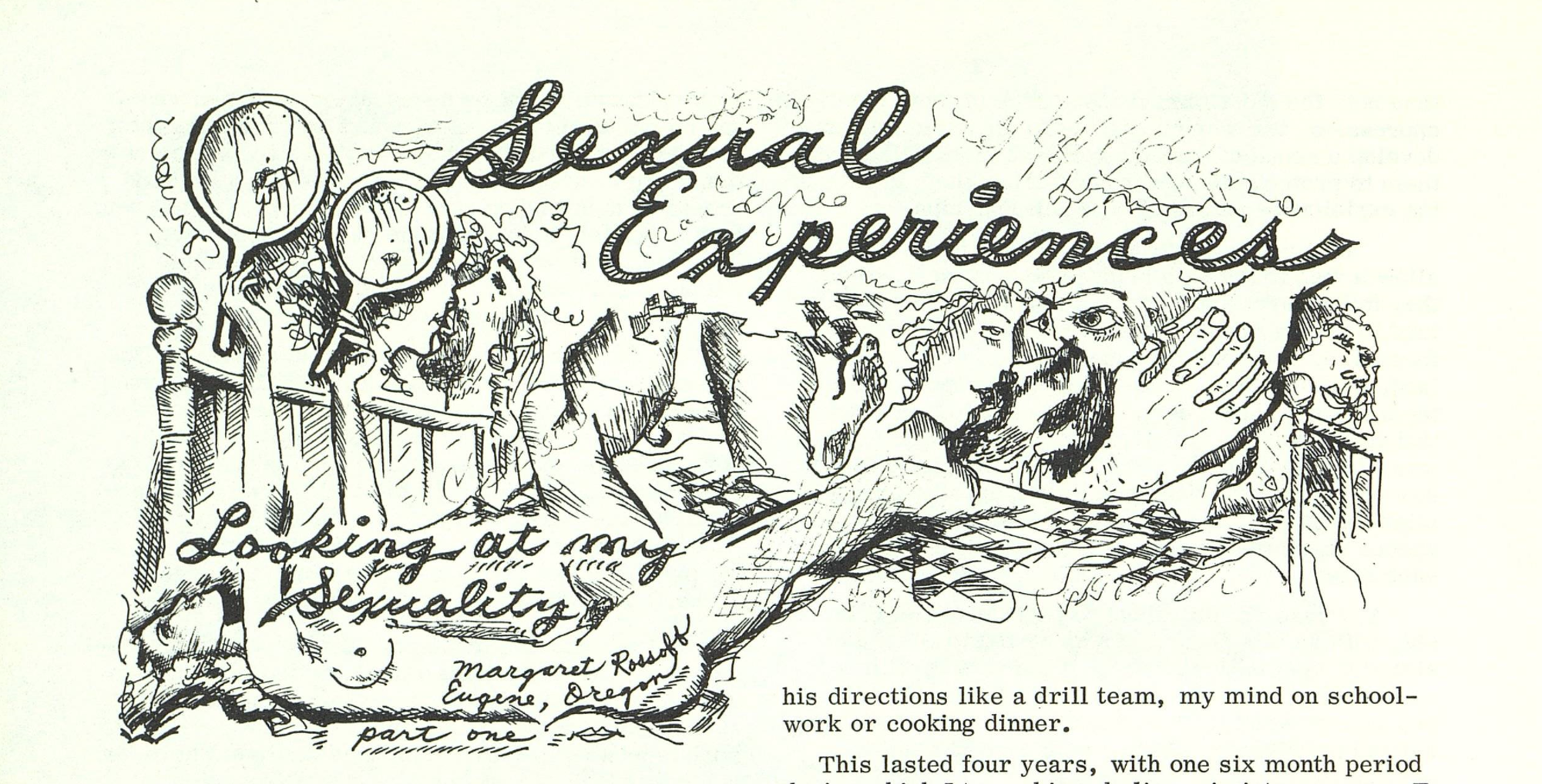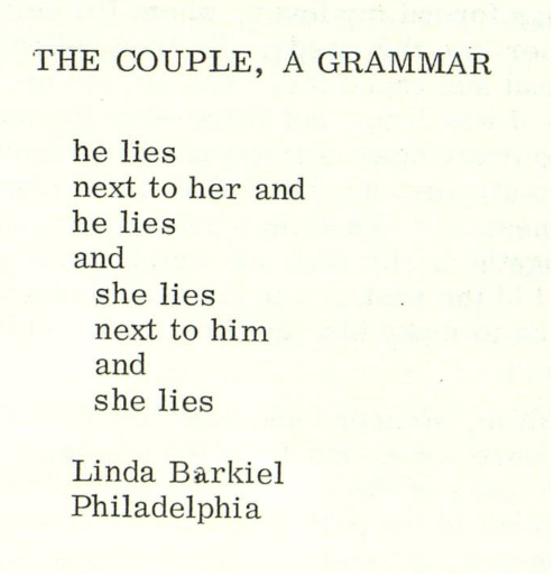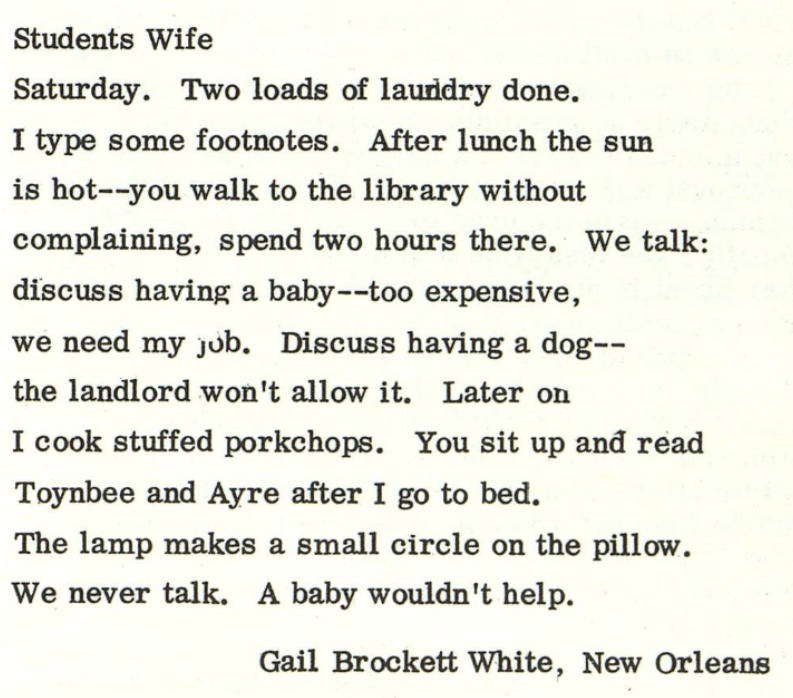The “Sexuality” issue of Women highlights how stereotypes of the male-female binary are manifested in the family. Stereotypes of males as dominant and females as submissive become evident in women’s recounting of sexual experiences throughout their lifetimes. Two articles in particular illustrate how the nuclear family upholds this power dynamic: “Sexual Experiences: Looking at My Sexuality” by Margaret Rossoff and “Our Sisters Speak: Liberating the Second Sex from the Heterosexual Norm” by various readers. Barbara Brenner Niziolek in the latter article explains the harmfulness of the classic “missionary” sex position. In add ition to thoroughly discussing society’s disregard of female pleasure, Niziolek explains that “the sexual roles played by male and female during coitus has always been an extension of the male and female roles played in social interactions” (Women 3.1, 60). Rossoff recounts her actions as a kid. “I used my pajamas and sheets to tie myself to the bed post, while developing a fantasy of enslavement to a man of great power and attractiveness,” she writes (Women 3.1, 44). “I didn’t understand for a long time that this was that notorious activity called sex” (Women 3.1, 44). These women discovered that sex was an intimate act where man’s pleasure is required just as seriously as society seemed to require heterosexuality. Lesbianism and female pleasure alike were considered shameful. Rossoff’s husband, after discovering how tense she was before intercourse, accused her of “not having a hole at all” (Women 3.1, 44). Diminished and objectified, Rossoff notes, “[my] orgasm stopped being mine” (Women 3.1, 45). Sex simply intensified women’s lack of control in the family.
ition to thoroughly discussing society’s disregard of female pleasure, Niziolek explains that “the sexual roles played by male and female during coitus has always been an extension of the male and female roles played in social interactions” (Women 3.1, 60). Rossoff recounts her actions as a kid. “I used my pajamas and sheets to tie myself to the bed post, while developing a fantasy of enslavement to a man of great power and attractiveness,” she writes (Women 3.1, 44). “I didn’t understand for a long time that this was that notorious activity called sex” (Women 3.1, 44). These women discovered that sex was an intimate act where man’s pleasure is required just as seriously as society seemed to require heterosexuality. Lesbianism and female pleasure alike were considered shameful. Rossoff’s husband, after discovering how tense she was before intercourse, accused her of “not having a hole at all” (Women 3.1, 44). Diminished and objectified, Rossoff notes, “[my] orgasm stopped being mine” (Women 3.1, 45). Sex simply intensified women’s lack of control in the family.
Linda Barkiel explores some of the issues within a nuclear family, headed by a monogamous heterosexual marriage, in her poem “The Couple, A Grammar.” She composes her poem in eight lines using eight different words. She takes advantage of the dual meaning of the word “lies,” using it four times in the short composition (Women 3.1, 17). She uses the word to indicate physical positioning — the couple lies in bed together — and to denote psychological play — the husband and wife tell lies; the couple presents an outward appearance of love while their relationship is riddled with deceit. Written in the third person, Barkiel’s poem makes the husband and wife’s knowledge of each other’s deception ambiguous. Poems like this and Gail Brockett White’s “Students Wife” tell stories of unhappy marriages filled with tension. They confirm the “How We Live and With Whom” editorial’s discussion of the “impossibility” of feeling satisfied in a monogamous relationship (Women 2.2, 1).


White’s poem concludes with the line, “We never talk” (Women 2.2, 13). Just lines before, she asserts, “we talk” (Women 2.2, 13). This contradiction perhaps indicates White’s ambivalence about the relationship or the emptiness of their “talk.” The once exciting passion that drew these two individuals to each other has since faded, and nothing, even having a child, can salvage what once was.
